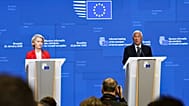Two men were arrested over the weekend for provoking Ukrainian refugees with pro-Russian slogans.
Germany has reported a rise in attacks against Ukrainian refugees and Russians since the start of the war.
Two Russian men were arrested on Monday after provoking Ukrainian nationals with pro-Moscow slogans, Berlin police said on Monday.
The suspects had taken part in a controversial pro-Russian convoy in the German capital over the weekend.
The two men -- aged 33 and 41 -- were aggressive, shouted abuse at police officers, and sought to provoke Ukrainians, police said in a statement.
One of them was reportedly wearing a victory sign in the colours of the Russian flag on his jacket.
Some 900 people in 450 vehicles carrying Russian flags also took part in a motorcade on Sunday, calling for the protection of Russian speakers and against discrimination.
The driver of one vehicle displaying the letter "Z" in support of Russia's military was stopped and ordered to leave.
"Offences against Russians and Russian facilities are on the rise," German Interior Minister Nancy Faeser told Neue Osnabruecker Zeitung (NOZ).
Since the end of February, Faeser said German police have recorded 308 anti-Russian offences, including 15 acts of violence.
The German interior ministry has also said that 109 offences against Ukrainian nationals had been recorded since the end of February, including 13 acts of violence. Most offences were reportedly property damage, insults and verbal threats.
"This conflict should not be allowed to creep into our society," Faeser told NOZ.
"We have to remind people that this is Putin's criminal war. It is not the war of people with Russian roots who live here in Germany."
Ukraine's ambassador to Germany Andrij Melnyk had criticised Berlin for allowing the pro-Russian convoy to take place.
"How could you allow this motorcade of shame in the middle of Berlin?" he said on Twitter.
"And on the day when the Russian massacres of Ukrainian civilians in Bucha came to light," he added, referring to allegations of war crimes.
Berlin mayor Franziska Giffey said she understood his "anger" but insisted on freedom of assembly.















